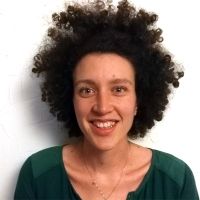
Laurence Willemet
Humans fundamentally rely on the haptic modality to manipulate and interact with their environment: Finding keys in the pockets, lighting a match or holding a pen are all activities that we could do eyes-closed, but without touch they are extremely difficult to complete. To achieve these tasks, we rely on the haptic modality, but rendering this haptic modality with sufficient quality is a large challenge in tele-robotics, where operators control robot manipulators over a distance.
In her research, Laurence Willemet is working on enabling a true remote touch, that not only reproduces forces but also the complete rich tactile interaction. Furthermore, she anticipates that the addition of remote touch will unlock a new, more intuitive, interaction where users can feel the environment. Users will rely on touch, not vision, which will activate already present sensory motor regulation and reduce cognitive load for the user.
This research project has been awarded a Marie Curie postdoctoral fellowship that will support her research for the next 3 years. Previously, she received her master’s degree in 2017 in technology applied to health in Strasbourg in France, where she worked on reducing surgeons’ fatigue during a robot-assisted suture task. She received her PhD from Aix-Marseille Université in France. During her PhD, she studied how the soft skin tissues deform to allow a fast sensation of friction on initial contact and during incipient slippage in humans. It received the recognition of the Eurohaptic Society PhD Award and has been recently published by Springer.
Last updated Jul 19 '23